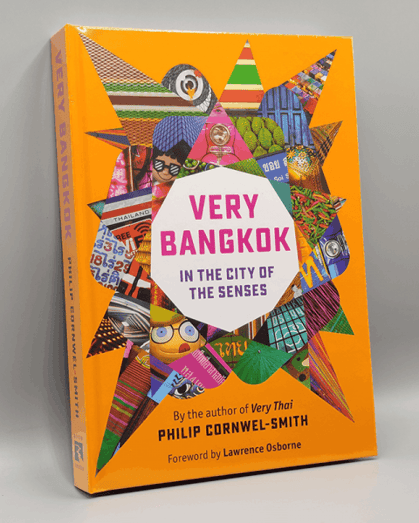
It is these sounds, sights, tastes and smells of Bangkok that Philip Cornwell-Smith attempts to dissect in his most recent book, Very Bangkok, which expertly explores how every hidden secret and cultural anomaly catches our senses and tickles our curiosity.
Donning his anthropological cap once again, some seven years after his highly-acclaimed second edition of Very Thai—which offers an in-depth exploration of Thai popular culture—Cornwell-Smith again shoots past the obvious and goes straight for the jugular, exposing the real-life spaces, faces and rat races that our technicolour capital hides best.
Guiding you down smelly canals, letting your mind stroll around fragrant gardens, and unmasking your misinterpretations on polluted highways, this well-written and deeply insightful guide to Krungthep Mahanakorn is a coffee table must, and much more besides. Each one of its 360 pages offers honest and visceral insights into the heart of Thailand’s most unique personality. His prose unapologetically frank, full of whimsy, and deliberately evoking.
Describing the city and its many suburbs as one “living, breathing art piece”, he skirts around more obvious topics such as ‘Streetfood’ and ‘Vertical Living’, before exposing new perspectives such as ‘Bang-Pop’, ‘Birdsong’, and ‘Bangkoklyn’. Cornwell-Smith, once again, serves up a dense helping of endless discoveries, picking apart every aspect of daily life and fondly sharing why Bangkok is so quintessentially iconic.
Leaving no stone uncovered, and no taboo unspoken, he explores both the popular and unpopular fame the city attracts. Seedy, sweaty red-light districts make way for auto-amnesiac destructions of history and free-flowing corruption that locals have come to expect and live to exploit. “Krungthep’s liveliness comes from constant churn;” he writes. “It reflects the fact that the city is structurally unstable at deeper levels. Things that most countries consider permanent, shift with surprising ease in Bangkok.”
Yet, as politics increasingly defines what it means to be “Thai”, the shifting political culture and recognition of the people and events that have defined the city’s almost clockwork cycle of protest, election and coup, are diplomatically scant. Instead, Cornwell-Smith focuses on how the overall idea of “Thainess” is evolving and forever being re-defined by society, a theme that plays a prominent role throughout Very Bangkok, just as it did in both editions of Very Thai.
And although a Chiang Mai version of his Very-series would be both fascinating, yet unlikely to make it to the printers, there are more than enough points and tidbits that can tickle the fancies of us Northern folk.
As an ex-Chiang Mai resident sat on a dusty Bangkok balcony, trying to read over the grinding hum of the city below, I was pleasantly surprised to find something on almost every page that evoked a sense of Northern nostalgia.
Marble-clad temples performing Lanna rituals with betel nut offerings and spirals of sai-ua sausages. Provincial-themed street parties that totally disregard the standstill traffic jams around them. Hercules Beetle fighting championships that go deep into the night. Regional transit that has “more jazzy stripes than Paul Smith socks”.
With countless references to the unique and Thai-defining elements that make up the Kingdom, it is no surprise that even those (un)lucky enough to avoid Bangkok altogether, can still pick up on many similarities to their hometown or provincial city sweetheart.
As always, Cornwell-Smith is a master in articulating the unexplainable and shining a light on the invisible. Very Bangkok is a five-star journey through the many tiers of the capital and offers a wide-open window onto the fluorescent pulse of the city. From city sewers to cultural hierarchies, every aspect of Bangkok’s rich identity is laid bare in spectacularly engaging and eye-opening detail.
Get to know Philip Cornwell-Smith in this Citylife interview.
Very Bangkok can be purchased at any major bookstore and online on Amazon, amongst many other sites
